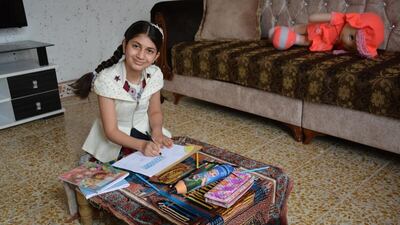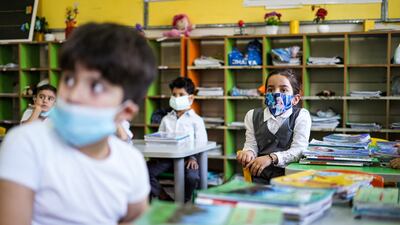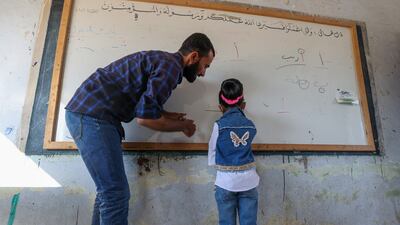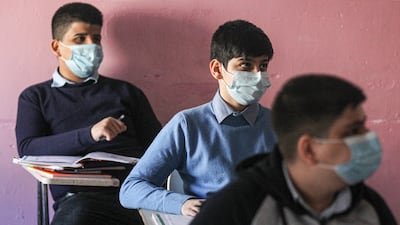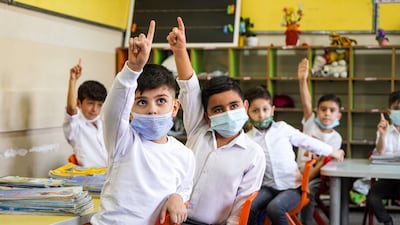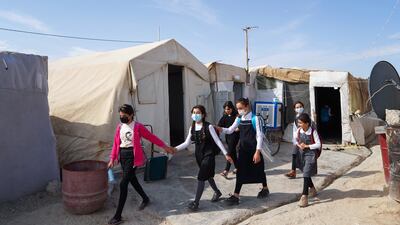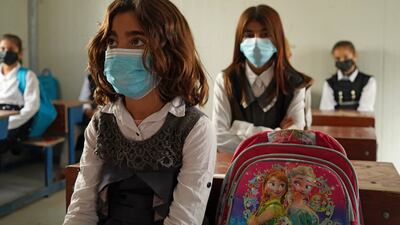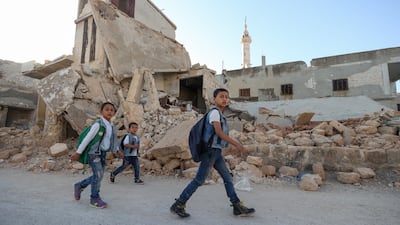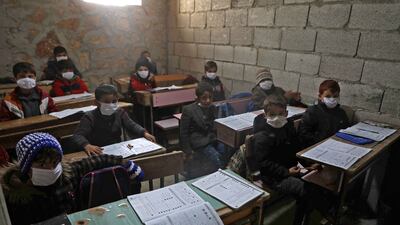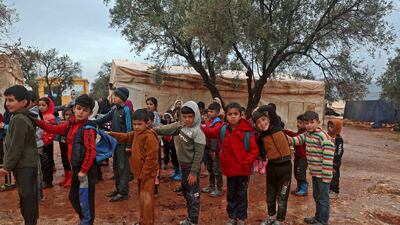Forty per cent of children in the Middle East and North Africa did not have access to remote learning at the height of the coronavirus pandemic, research reveals.
About 37 million were unable to learn remotely during lockdowns in 2020, mainly because of a lack of devices and internet connection, said a report by the World Bank and UN agencies Unicef and Unesco.
“This group of children didn’t have access to a smartphone, a laptop or tablet,” said Juliette Touma, regional chief of advocacy and communication for Unicef Middle East and North Africa. “In many cases they didn’t have access to TV or radio. It really impacts those living on a lower income and in rural areas.”
It is part of a crisis in education in the region caused by poverty, conflict, stubbornly high dropout rates – especially among girls – and schools that do not always equip pupils for 21st century jobs, experts told The National.
Unicef Middle East and North Africa
Covid-19 has worsened the situation by making it harder for children to attend lessons.
The Mena region had one of the world’s highest proportions of children who could not take part in remote learning.
The only regions worse off were West and Central Africa, where 48 per cent of children missed out, and Eastern and Southern Africa, where the proportion was 49 per cent.
Around the world, 31 per cent of children did not have access to remote learning in 2020.
Even before the pandemic, 15 million children in Mena were out of education because of poverty and conflict, said Ms Touma, speaking before World Education Day on Monday, January 24.
“The crisis in education is not something new to the Mena region,” she said. “Obviously, Covid has exacerbated this problem.”
She said it was “commendable” that all governments in the region, regardless of their circumstances, had managed to put their curriculum online for children.
But the longer children remain physically out of school the greater the risk they will be pushed into child labour or early marriage, or be recruited by militia or armed forces, she added.
“There is no alternative to children being physically present in school,” she said. “The longer children stay out of school, the more difficult it is for them to catch up. This has been proven in countries in the region affected by conflict.”
Unicef has urged governments to fund schools to implement measures such as mask wearing, hand sanitising and, where possible, rapid testing so pupils can return swiftly and safely.
“Being at school, at a time of Covid, is absolutely possible,” Ms Touma said.
“School is not just about learning. It's about making friends, it's about playing sport, it’s about learning to fail.
“It’s about all of those things that remote learning just doesn’t give you.”
Children who are denied even remote learning may also earn less in the future, the report said.
“For a single individual in Mena, these projected losses translate to close to $15,000 loss in lifetime earnings based on the optimistic scenario,” it warned.
The loss of lifetime earnings for people in wealthy Mena countries is expected to be greater than for those in low-income nations, mainly because earnings are already high.
Optimistic projections show the average child in a high-income Mena nation will lose $160,389 in earnings over their lifetime because of disruption to education caused by the pandemic, compared with $7,192 in poorer countries in the region, the report said.
Youth unemployment in Mena has been the highest in the world for decades. More than a quarter of young people were jobless in 2019, according to the World Bank.
This is because the education system is failing to equip young people with the skills they need in today’s job market, said Ms Touma.
There is too much emphasis on memorising, rather than on cultivating skills such as critical thinking, communication and analysis, meaning there is an urgent need to make the curriculum “21st century savvy”, she said.
Until recently, most job opportunities in the region were in the public sector, which has become very “bloated”, she said.
Creating conditions that allow private enterprise to flourish and greater investment in early education will help to tackle youth unemployment in the Mena region, said a report by consulting firm McKinsey last year.
“Starting education in early childhood has a major impact on a child’s cognitive abilities later in life and subsequently on their long-term economic future,” it said.
Studies have shown that the return on investment in early childhood education is up to seven times higher than in any other stage of schooling, said the report.
The economic potential of women and girls in the region is also blighted by early marriage and high drop-out rates, Unicef figures show.
Across the Mena region, 32 per cent of girls of upper secondary school age were out of education last year. That compares with 16 per cent in East Asia and the Pacific and 48 per cent in Sub-Saharan Africa.
Yemen, Iraq and Sudan had the highest rates for girls dropping out of upper secondary school in the region.
“One of the biggest barriers to girls’ education is an expectation that they marry before they turn 18,” said Mohamed Alasmar, Save the Children’s advocacy director for the Middle East and Eastern Europe. “Once married, a girl’s chances of finishing education are greatly reduced.”
Governments should set the legal minimum age of marriage at 18 and remove all exceptions to this rule, he said.
One in five girls in the Mena region is married before she turns 18, according to Unicef.
Even in the face of adversity, girl such as Rima, 19, remain determined to study.
The teenager lives in a Syrian refugee camp. She fled her village after violence broke out and extremists imposed restrictions on girls’ education.
Now, she attends a learning centre at the camp and has been preparing to sit exams.
“A girl needs to maintain a strong will to continue her education in order to move forward in life,” she said.
Pandemic compounded refugee crisis
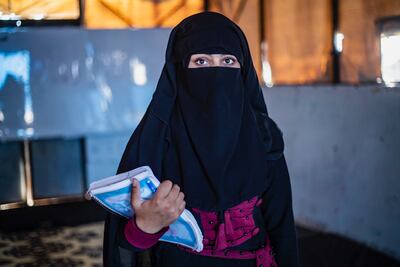
Raya and Rima are two girls whose lives have been scarred by war.
Yet they are both determined to get an education, so they can improve their lives and the lives of others.
Raya, 12, lives in Iraq, where her school was damaged during conflict with ISIS.
Although this was upsetting for her, it also inspired Raya to want to grow up to become an engineer so she would have the skills to rebuild schools damaged by war.
Raya now goes to a child protection and education centre run by Save the Children.
“When I first came to the centre, I couldn’t read or write,” she said. “But now I learnt so much and learnt some English as well.”
Raya’s mother Nadia said her daughter has been encouraging other children in their area to go to the centre and learn too.
19, Syrian refugee
Rima, 19, lives in a refugee camp in Syria. She fled her village in the north-east of the country when violence broke out.
“We were 15 persons with only the clothes on our backs,” she said. “[We were] just running for our lives.”
While Rima was living in her village she missed out on several years of schooling because extremists placed restrictions on girls' education.
Since arriving in the camp, which is home to around 14,000 displaced people, she has been able to resume her education at a learning centre, set up with support from Unicef.
“Since dropping out of school, I lost a lot of what I had learnt before,” she said. “I had been away from school for years, so I worried I wouldn't be able to catch up.”
Rima enrolled in remedial classes at the centre. She worked hard and passed her grade nine national examinations. She wants to be a doctor so she can help people.
She is also a passionate advocate of education for girls.
“Education is the most powerful weapon a girl can have in the face of difficult circumstances,” she said.
